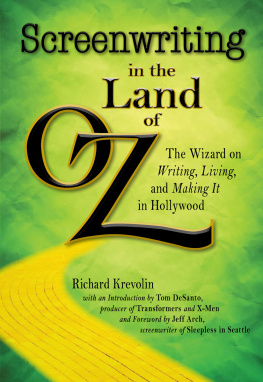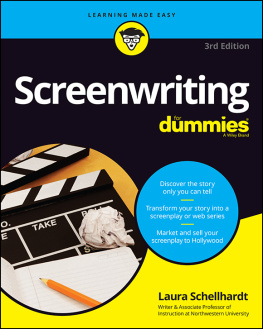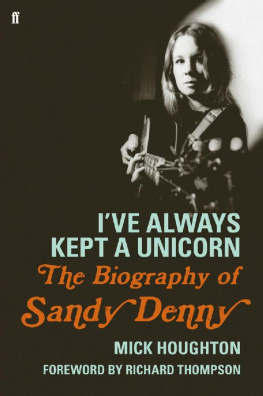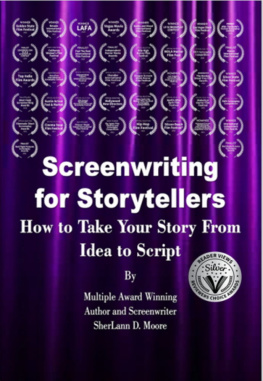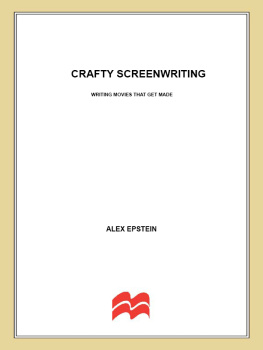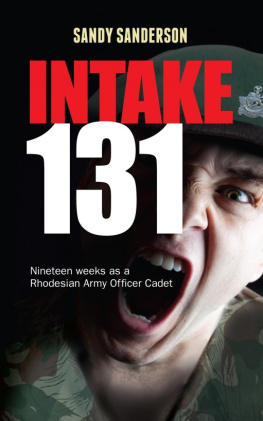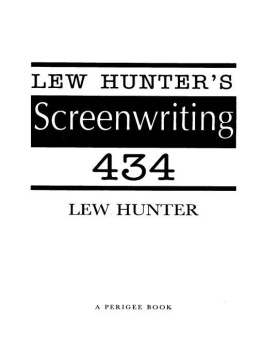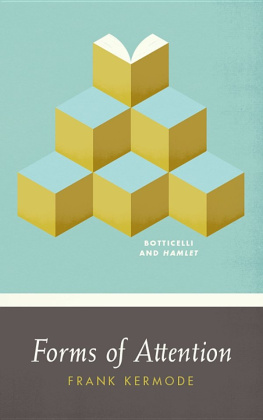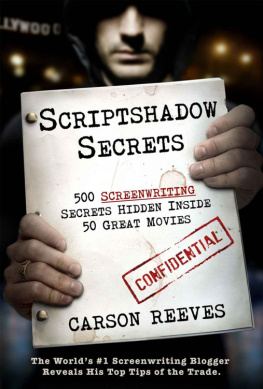Sandy Frank - The Inner Game of Screenwriting: 20 Winning Story Forms
Here you can read online Sandy Frank - The Inner Game of Screenwriting: 20 Winning Story Forms full text of the book (entire story) in english for free. Download pdf and epub, get meaning, cover and reviews about this ebook. year: 2011, publisher: Michael Wiese Productions, genre: Art. Description of the work, (preface) as well as reviews are available. Best literature library LitArk.com created for fans of good reading and offers a wide selection of genres:
Romance novel
Science fiction
Adventure
Detective
Science
History
Home and family
Prose
Art
Politics
Computer
Non-fiction
Religion
Business
Children
Humor
Choose a favorite category and find really read worthwhile books. Enjoy immersion in the world of imagination, feel the emotions of the characters or learn something new for yourself, make an fascinating discovery.

- Book:The Inner Game of Screenwriting: 20 Winning Story Forms
- Author:
- Publisher:Michael Wiese Productions
- Genre:
- Year:2011
- Rating:4 / 5
- Favourites:Add to favourites
- Your mark:
- 80
- 1
- 2
- 3
- 4
- 5
The Inner Game of Screenwriting: 20 Winning Story Forms: summary, description and annotation
We offer to read an annotation, description, summary or preface (depends on what the author of the book "The Inner Game of Screenwriting: 20 Winning Story Forms" wrote himself). If you haven't found the necessary information about the book — write in the comments, we will try to find it.
Sandy Frank: author's other books
Who wrote The Inner Game of Screenwriting: 20 Winning Story Forms? Find out the surname, the name of the author of the book and a list of all author's works by series.
The Inner Game of Screenwriting: 20 Winning Story Forms — read online for free the complete book (whole text) full work
Below is the text of the book, divided by pages. System saving the place of the last page read, allows you to conveniently read the book "The Inner Game of Screenwriting: 20 Winning Story Forms" online for free, without having to search again every time where you left off. Put a bookmark, and you can go to the page where you finished reading at any time.
Font size:
Interval:
Bookmark:
The perfect blend of theory and step-by-step instructions. Just when you thought there was nothing left to say about screenwriting, along comes Sandy Frank's Inner Game of Screenwriting.
LAWRENCE KONNER, writer on The Sopranos, screenwriter: The Jewel of the Nile, Planet of the Apes, Superman IV: The Quest for Peace, Star Trek VI: The Undiscovered Country
The Inner Game of Screenwriting offers the kind of wisdom writers can understand. Not only does Sandy cast a sharp eye on the emotional aspects of screenplay construction, but he understands what a script really needs in order to be commercial. Invaluable.
JOEL SURNOW, creator: 24
In my job, I read a lot of scripts good, bad, and all things in between. I can honestly say, if you read and heed this book, you will be ahead of the game. Written with tremendous insight and a candor that is rare, Sandy provides practical advice that will benefit the inexperienced or experienced writer. I highly recommend it!
DAVID STAPF, President, CBS Television Studios
Sandy Frank understands and explains screenplay structure better than any other writer I've worked with. His advice has always improved my scripts.
LAWRENCE O'DONNELL, Emmy-winning executive producer and writer of The West Wing, host of The Last Word with Lawrence O'Donnell (MSNBC)
Sandy Frank's The Inner Game of Screenwriting starts by explaining that the writing of scripts can be divided into two components the inner (emotional/character-driven), and outer (plot-driven) games. The premise is that for a film or show to be successful, the inner game must be solid. The interesting thing is, in the book's seven parts, the theory is explained, tested, and even challenged by the author, using generous examples. This is a thorough look at why some films/TV shows (including adaptations, sequels, and remakes), resonate stronger with audiences than others, and how to write these kinds of scripts yourself.
ERIN CORRADO, OneMovieFiveReviews.com

SANDY FRANK
MICHAEL WIESE PRODUCTIONS
Published by Michael Wiese Productions
12400 Ventura Blvd. #1111
Studio City, CA 91604
(818) 379-8799, (818) 986-3408 (FAX)
www.mwp.com
Cover design by Johnny Ink. www.johnnyink.com
Interior design by Jay Anning
Printed by McNaughton & Gunn
Manufactured in the United States of America
Copyright 2011 by Sandy Frank
All rights reserved. No part of this book may be reproduced in any form or by any means without permission in writing from the author, except for the inclusion of brief quotations in a review.
Library of Congress Cataloging-in-Publication Data
Frank, Sandy, 1954
The inner game of screenwriting : 20 winning story forms / Sandy Frank.
p. cm.
ISBN 978-1-61593-061-6
1. Motion picture authorship. 2. Television authorship. I. Title.
PN1996.F73 2011
808.23 dc23
2011017958
Printed on Recycled Stock
To my perfect Pam,
who loved and supported me
every step of the way
USING THE ENNEAGRAM TO
CONSTRUCT MORPH INNER GAMES
ADAPTATIONS, SEQUELS,
AND REMAKES
THE INNER
GAME OF
SCREENWRITING
This book will introduce the concept of the Inner Game of Screenwriting. It's a big picture theory, describing not the hundred things your screenplay needs, but the single biggest thing a screenplay needs to be successful an Inner Game. It's strategy, not tactics.
This first part of the book will describe the Inner Game of Screenwriting in detail.
OF SCREENWRITING
H OW CAN YOU USE THIS BOOK? If you're a screenwriter novice or pro you probably picked this book up because you'd like to learn more about writing a screenplay. But why is that? If you're like most screenwriters, you've taken courses and read books on the subject. You may even have gone to college to study it.
So why don't you already know how to do it? Why is screenwriting so hard?
Let's start off with a metaphor. A guy who knows absolutely nothing about golf, has never played it or even seen it, hears that it's a fun game and decides he wants to play. So he goes to a local golf coach and asks for lessons.
The coach is happy to take him on. He tells him that he has boiled the game down to the essentials. Lessons like Keep your head down and Keep your left elbow straight.
The new student dives right in and works and practices harder than anyone ever has. His drives at the range get longer and straighter and his putting gets more accurate. He just keeps getting better and better.
Finally, he goes out on his own to play his first game, and shoots a 160. (If you're unfamiliar with golf, that's really, really bad.)
Why did he do so badly? Not because of anything the coach told him, but because of something the coach didn't tell him that the object of the game is to get the ball into the holes in the fewest number of strokes.
Now that may seem silly, because everyone knows that. But if you think about it, there could be other objectives to hit the ball as high as possible, or to use the clubs in numerical order. Or think about a game you're unfamiliar with, maybe the Japanese game of Go. It's not inconceivable that you could take Go lessons for a while, learning how to make moves, but without learning how you win the game. The point is that the hypothetical golf student never learned his objective, what he was ultimately trying to accomplish.
I sometimes feel that the same is true for us screenwriters we've never been taught exactly what it is we're trying to do. So we write and we write, and sometimes it works out and sometimes it doesn't, but we often don't know why.
Ask screenwriters what they're trying to do when they sit down to start their screenplays, and what kinds of answers would you expect? Some, especially if they're getting paid, will say that they're trying to fill 110 pages with properly formatted description and dialog. I remember years ago, a friend of mine he wasn't a screenwriter, he was a bond trader told me that he had just written a screenplay. At the time I was a television writer thinking about tackling a spec feature, so I asked him how he went about it. His bemused answer: he started typing on page one and stopped when he reached 110. Not exactly the advice I was looking for.
Others might tell you they're trying to tell a good story, but that just changes the question to What's a good feature story? After all, there are plenty of amusing stories I've heard at dinner that wouldn't make good features. There are plenty of gripping news stories that wouldn't, either.
There's a lot of information about screenwriting out there, and we all learn things like: keep the dialog snappy, start scenes late, hit your act breaks around pages 30 and 90. But few authors or teachers explain to us our ultimate goal: what, in simple terms, are we trying to do?
Not because they're trying to keep it a secret, but because they don't know either. After all, if somebody knew really knew what made a screenplay good, wouldn't word get around and then wouldn't every screenplay be pretty good? Instead, even the best screenplays, the ones that actually get bought and shot on film and shown in theaters, are still hit-or-miss. Even a screenwriter who writes one great screenplay can go on to fail at his next. So there's something that remains mysterious about the process.
Font size:
Interval:
Bookmark:
Similar books «The Inner Game of Screenwriting: 20 Winning Story Forms»
Look at similar books to The Inner Game of Screenwriting: 20 Winning Story Forms. We have selected literature similar in name and meaning in the hope of providing readers with more options to find new, interesting, not yet read works.
Discussion, reviews of the book The Inner Game of Screenwriting: 20 Winning Story Forms and just readers' own opinions. Leave your comments, write what you think about the work, its meaning or the main characters. Specify what exactly you liked and what you didn't like, and why you think so.

